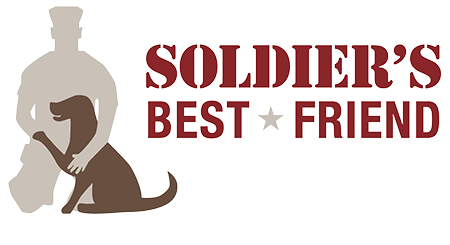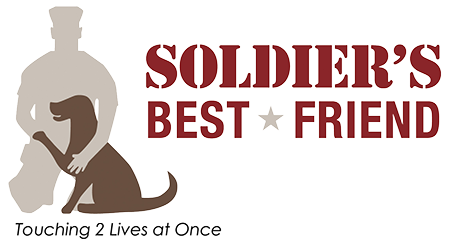- What is your mission?
- Is Soldier's Best Friend a nonprofit organization?
- When did Soldier's Best Friend begin?
- Do you have sister organizations outside of Arizona?
- How do I request an application for a service dog?
- Do you accept veterans not diagnosed with PTSD or TBI?
- What is involved in the application process?
- How long does it take to get in the program after the point of initial contact?
- What and how is qualification accomplished?
- How much will your program cost the veteran?
- Do I need to be an Arizona resident to be accepted into the program?
- Where do you train?
- Where do the dogs come from?
- Can I pick out my dog or choose the breed?
- Can I use my own dog for training?
- Which dog is best for me?
- Who owns the dog?
- How long will the training take before my dog and I graduate?
- Does a Service Dog or Therapeutic Companion Dog really help the veteran’s symptoms of PTSD or TBI?
- Why do I need a Service Dog or a Therapeutic Companion Dog?
- What is the difference between a Service Dog and a Therapeutic Companion Dog?
- What kind of tasks will my dog be trained to do and how is that going to help my symptoms of PTSD or TBI?
- Will the dog be fostered during its training?
- I want to volunteer. How do I get involved?
- Do you give talks to local organizations?
- I have questions about the Americans with Disabilities Act and service dogs
-
What is your mission?
Soldier’s Best Friend provides U.S. military veterans living with military service-related Post Traumatic Stress Disorder (PTSD) or Traumatic Brain Injury (TBI) with Service or Therapeutic Companion Dogs, most of which are rescued from local shelters. The veteran and dog train together to build a trusting relationship that touches two lives at once and inspires countless others.
-
Is Soldier's Best Friend a nonprofit organization?
Yes, Soldier's Best Friend is a 501(c)3 tax exempt public charity.
-
When did Soldier's Best Friend begin?
Soldier's Best Friend was incorporated in the state of Arizona in January 2011 as a nonprofit corporation. In March of that same year, we received our IRS determination letter for tax exempt status. We began our first pairings and trainings in May 2011.
-
Do you have sister organizations outside of Arizona?
We are strictly an Arizona-based organization. There are other training programs across the country doing similar work, but we are not affiliated with any other organization.
-
Go to the Request Application page on our website. Complete the form and submit your request for an application. Upon successful submission, we will email a comprehensive application packet to you for consideration of placement and training with a service dog. If you don't find it in your email inbox, please check your Spam folder.
If you do not have email access, we can mail the application packet. Please call (623) 218-6486 to request a packet be mailed to you.
-
Do you accept veterans not diagnosed with PTSD or TBI?
Our program serves veterans with military service-related PTSD or TBI. A confirmation of diagnosis is required as part of the application process.
-
What is involved in the application process?
Request an application. You will receive an email with the full application packet, which includes:
- 5-page application to be filled out by you;
- a confirmation of diagnosis form to be completed by your doctor, counselor, or mental health provider;
- two (2) letters of reference; at least one of these must be from a non-family member;
- a VA medical release of information form.
- SBF also requires you to provide a copy of your DD214.Your paperwork will be submitted for review.
SBF representatives will perform a home inspection and conduct a personal interview with you and adults living in your home.
After all this is completed, we review the application papers and determine acceptance status. -
How long does it take to get in the program after the point of initial contact?
From the point of you having all your paperwork submitted, it takes approximately 2 – 3 months to know of your acceptance status. If we are partnering you with a dog, searching for a rescue dog begins with the veteran’s acceptance, sometimes taking an extended period of time. The type of dog needed is dictated by the veteran’s living situation. Living situations vary and can affect the time it takes to find the right dog. Veterans owning their dogs are required to attend a behavior and temperament evaluation in a public setting to determine the dog’s acceptance status.
-
What and how is qualification accomplished?
Our organization qualifies service dogs by training them to meet specific criteria aligned with the Canine Good Citizen standards, four Public Access Tests, an airport outing, and a requirement for the veteran-dog team to master a minimum of three tasks related to the veteran's symptoms of PTSD and/or TBI. The teams undergo evaluations to demonstrate their proficiency in all these skills. Veterans also receive education on proper healthcare, husbandry practices, training techniques, and an understanding of the Americans with Disabilities Act (ADA) regulations. Upon successful completion of all requirements, the veteran-dog team graduates, and the dog qualifies as a service dog.
-
How much will your program cost the veteran?
There will be absolutely no fees to the veteran during the placement and training period. We are committed to that.
The only costs to the veteran would be transportation to attend lessons and basic care for their dog (ex. dog food). We provide training equipment such as collars, leashes, dog boots and crates. If a veteran relocates to Arizona during the training period, they are responsible for their own transportation, housing and meals.
All of our dogs will be spayed, neutered, vaccinated and receive all recommended preventative medications prior to placement. If you are placed with a rescue dog, routine veterinary services, and most supplies will be at no charge to the veteran during the training process. Dogs owned by the veteran will be offered veterinary services at a reduced rate during training.
Following graduation, ownership of the rescue dog is transferred to the veteran who will then be responsible for costs and care. Reduced veterinary fees are offered through a group of volunteer veterinary hospitals in Arizona.
-
Do I need to be an Arizona resident to be accepted into the program?
No! We consider all eligible veterans of any U.S. military branch for acceptance. However, you will need to be in Arizona for the training sessions AND be responsible to find housing during the training period (a minimum of 6 - 9 months).
-
Where do you train?
We train at locations in the Phoenix area, Tucson, Prescott, Flagstaff, Yuma, Show Low, Kingman, and Sierra Vista.
-
Where do the dogs come from?
Soldier's Best Friend is devoted to rescuing homeless Arizona dogs. We have a network of rescue groups and shelters throughout Arizona to acquire our dogs. If the veteran has their own personal dog, and it meets age, behavior and temperament standards, it is possible for their dog to participate in the program.
Please note that we do not accept dog donations.
-
Can I pick out my dog or choose the breed?
When selecting a dog for our program, the first consideration is whether the dog is capable of doing the work. Secondarily, the dog must be of the size and temperament to be a good fit for the veteran’s living situation. Breed/type preferences can be considered after other criteria are met.
-
Can I use my own dog for training?
Yes, in some cases. We will evaluate your dog for behavior and temperament standards to determine if it will be accepted into our training program. Here are some things to consider:
- Dogs cannot show aggressive behavior toward people or other animals.
- Wolf and coyote hybrids will not be considered for training as service dogs.
- Dogs cannot display extreme anxiety or nervousness.
- To be considered, dogs cannot be younger than 9 months and no older than 3 years old.
- The dog must be spayed or neutered before it is permitted to begin training in the program. -
Which dog is best for me?
The Service Dog is for handlers with PTSD and/or TBI who need the medical benefit of their dog on a constant basis. The Therapeutic Companion Dog will benefit the veteran while at home and in public areas where any dog is allowed. They will be trained with specific tasks to help the veteran cope with their PTSD/TBI symptoms.
-
Who owns the dog?
Soldier's Best Friend owns its rescued dogs until the veteran/dog team graduates. After graduation, ownership is transferred to the veteran.
-
How long will the training take before my dog and I graduate?
Service Dog training takes a minimum of (6) six to (9) months to complete the program. Most veteran/dog teams need more time to master the skills necessary to qualify as a service dog. Therapeutic Companion Dog (TCD) training is a shorter length of time, typically a minimum of 4 months. However, a TCD cannot go to many public places where a service dog is allowed.
-
Does a Service Dog or Therapeutic Companion Dog really help the veteran’s symptoms of PTSD or TBI?
Yes! Anecdotal studies show as many as 80% of patients improve. Some are even reducing or eliminating their need for medication.
-
Why do I need a Service Dog or a Therapeutic Companion Dog?
A Service or Therapeutic Companion Dog can help you recover and adjust back into civilian life easier if you experience:
Panic attacks
Anxiety
Depression
Bad Nightmares
Flashbacks
Uneasiness in crowded places
Irritability
Hypervigilance
Suicidal thoughts
Reclusive behavior -
What is the difference between a Service Dog and a Therapeutic Companion Dog?
A Service Dog has been trained to perform a minimum of three (3) tasks specific to its handler’s disability. It is allowed by law to accompany its handler to public places such as the veteran’s work place, restaurants, buses, stores etc. These are rights set forth in the Americans with Disabilities Act (ADA).
A Therapeutic Companion Dog will not be allowed to enter most public venues. Exceptions are airplane cabins and living in non-pet friendly housing.
-
What kind of tasks will my dog be trained to do and how is that going to help my symptoms of PTSD or TBI?
The following are a few examples of tasks a Service or Therapeutic Companion Dog could do for you:
Travel beside you in public places such as restaurants, grocery stores, buses, etc. helping to ease any anxiety you may experience. **For service dogs only, in accordance with the Americans with Disability Act (ADA).
When in a crowded environment, your dog will stay between you and another person creating additional space.
Helping to deal with several personal or public issues that may suddenly arise. An example might be the dog making physical contact in the event of rising anxiety.
Alert you when someone walks up behind you.
Remind you to take medications. -
Will the dog be fostered during its training?
Dogs rescued and adopted by Soldier's Best Friend are fostered for approximately 4 - 6 weeks before placement with a veteran. Once the dog is paired with its veteran handler, they live together from that point on. Our program is based on an owner-handler model, which emphasizes the human-animal bond by teaching the handler to train his/her dog. This model also empowers the handler to continue lifelong training of his/her dog.
-
I want to volunteer. How do I get involved?
If you are interested in volunteer opportunities, you may apply for skills-based volunteerism, or you may apply to be a foster to help a rescued dog prepare to be placed with their veteran partner.
-
Do you give talks to local organizations?
Absolutely. If you are interested in having Soldier’s Best Friend attend your presentation or event, please call 623-218-6486 or email: events@soldiersbestfriend.org. In your e-mail include: contact name, phone number, e-mail address, organization info and proposed date(s) time of event. Our Event Coordinator will contact you.
-
I have questions about the Americans with Disabilities Act and service dogs
The U.S. Department of Justice has a very good FAQ resource about service dogs and the ADA. https://www.ada.gov/regs2010/service_animal_qa.html



